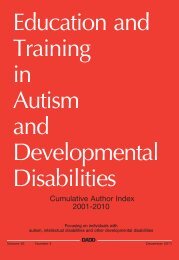Download the Journal (PDF) - Division on Autism and ...
Download the Journal (PDF) - Division on Autism and ...
Download the Journal (PDF) - Division on Autism and ...
You also want an ePaper? Increase the reach of your titles
YUMPU automatically turns print PDFs into web optimized ePapers that Google loves.
Discussi<strong>on</strong> <strong>and</strong> Recommendati<strong>on</strong>s<br />
Lakewood’s preemptive c<strong>on</strong>clusi<strong>on</strong> regarding<br />
<str<strong>on</strong>g>the</str<strong>on</strong>g> need for guardianship for all students is<br />
problematic. The root of <str<strong>on</strong>g>the</str<strong>on</strong>g> problems surrounding<br />
<str<strong>on</strong>g>the</str<strong>on</strong>g> issue of guardianship at Lakewood<br />
is that <str<strong>on</strong>g>the</str<strong>on</strong>g> planning for guardianship is<br />
separated from <str<strong>on</strong>g>the</str<strong>on</strong>g> transiti<strong>on</strong> process. The<br />
result is that <str<strong>on</strong>g>the</str<strong>on</strong>g> student, family, school, adult<br />
service providers, <strong>and</strong> o<str<strong>on</strong>g>the</str<strong>on</strong>g>rs are not making a<br />
fully-informed, well-planned group decisi<strong>on</strong>.<br />
Discussi<strong>on</strong> of <str<strong>on</strong>g>the</str<strong>on</strong>g> individual student’s<br />
strengths, needs, preferences, <strong>and</strong> interests in<br />
relati<strong>on</strong> to <str<strong>on</strong>g>the</str<strong>on</strong>g> guardianship process has not<br />
occurred. Alternatives <strong>and</strong> opti<strong>on</strong>s that may<br />
work for <str<strong>on</strong>g>the</str<strong>on</strong>g> student have not been discussed.<br />
Guardianship has not been c<strong>on</strong>sidered in c<strong>on</strong>juncti<strong>on</strong><br />
with <str<strong>on</strong>g>the</str<strong>on</strong>g> assumpti<strong>on</strong> of o<str<strong>on</strong>g>the</str<strong>on</strong>g>r adult<br />
roles. Full guardianship becomes a set path<br />
for every student, as opposed to a process,<br />
such as <str<strong>on</strong>g>the</str<strong>on</strong>g> transiti<strong>on</strong> process that is individualized<br />
for each student <strong>and</strong> family according<br />
to <str<strong>on</strong>g>the</str<strong>on</strong>g>ir needs <strong>and</strong> desires<br />
Based up<strong>on</strong> our observati<strong>on</strong>s, we make <str<strong>on</strong>g>the</str<strong>on</strong>g><br />
following recommendati<strong>on</strong>s related to <str<strong>on</strong>g>the</str<strong>on</strong>g><br />
role of <str<strong>on</strong>g>the</str<strong>on</strong>g> guardianship process within <str<strong>on</strong>g>the</str<strong>on</strong>g><br />
transiti<strong>on</strong> planning process. First, both <str<strong>on</strong>g>the</str<strong>on</strong>g><br />
transiti<strong>on</strong> planning <strong>and</strong> guardianship processes<br />
should be based up<strong>on</strong> an <strong>on</strong>going assessment<br />
of <str<strong>on</strong>g>the</str<strong>on</strong>g> student’s strengths, needs,<br />
preferences, <strong>and</strong> interests. This is a required<br />
comp<strong>on</strong>ent of <str<strong>on</strong>g>the</str<strong>on</strong>g> transiti<strong>on</strong> planning process<br />
(IDEA 2004). The transiti<strong>on</strong> assessment process<br />
is an ideal vehicle to identify <str<strong>on</strong>g>the</str<strong>on</strong>g><br />
strengths, needs, preferences, <strong>and</strong> interests of<br />
<str<strong>on</strong>g>the</str<strong>on</strong>g> individual. The IEP team can <str<strong>on</strong>g>the</str<strong>on</strong>g>n identify<br />
<str<strong>on</strong>g>the</str<strong>on</strong>g> supports <strong>and</strong> accommodati<strong>on</strong>s needed by<br />
<str<strong>on</strong>g>the</str<strong>on</strong>g> individual to transiti<strong>on</strong> to adult life. The<br />
Associati<strong>on</strong> for Pers<strong>on</strong>s with Severe H<strong>and</strong>icaps<br />
(TASH; 2003) in <str<strong>on</strong>g>the</str<strong>on</strong>g> TASH Resoluti<strong>on</strong> <strong>on</strong><br />
Alternatives to Guardianship urged “<str<strong>on</strong>g>the</str<strong>on</strong>g> development<br />
<strong>and</strong> promoti<strong>on</strong> of <str<strong>on</strong>g>the</str<strong>on</strong>g> use of accommodati<strong>on</strong>s<br />
<strong>and</strong> supports people need to make<br />
choices <strong>and</strong> decisi<strong>on</strong>s, to have <str<strong>on</strong>g>the</str<strong>on</strong>g>ir preferences<br />
recognized <strong>and</strong> h<strong>on</strong>ored, <strong>and</strong> to have<br />
<str<strong>on</strong>g>the</str<strong>on</strong>g>ir rights to self-determinati<strong>on</strong> protected.”<br />
In this same resoluti<strong>on</strong> TASH committed to<br />
<str<strong>on</strong>g>the</str<strong>on</strong>g> promoti<strong>on</strong> <strong>and</strong> use of alternatives to<br />
guardianship.<br />
Sec<strong>on</strong>d, schools must recognize students as<br />
emerging young adults, <strong>and</strong> prepare <str<strong>on</strong>g>the</str<strong>on</strong>g>m to<br />
assume a variety of adult roles. Third, schools<br />
should prepare students for <str<strong>on</strong>g>the</str<strong>on</strong>g> assumpti<strong>on</strong> of<br />
<str<strong>on</strong>g>the</str<strong>on</strong>g>se adult roles by helping students develop<br />
<strong>and</strong> practice self-determinati<strong>on</strong> skills. Developing<br />
students’ aut<strong>on</strong>omy <strong>and</strong> voice will allow<br />
<str<strong>on</strong>g>the</str<strong>on</strong>g>m to participate in <str<strong>on</strong>g>the</str<strong>on</strong>g>ir transiti<strong>on</strong> planning<br />
to a greater degree <strong>and</strong> will allow <str<strong>on</strong>g>the</str<strong>on</strong>g>m to<br />
advocate for <str<strong>on</strong>g>the</str<strong>on</strong>g>mselves in <str<strong>on</strong>g>the</str<strong>on</strong>g> future.<br />
Fourth, <str<strong>on</strong>g>the</str<strong>on</strong>g> transfer of rights at age of majority<br />
should be seen as a key point in <str<strong>on</strong>g>the</str<strong>on</strong>g><br />
transiti<strong>on</strong> process, ra<str<strong>on</strong>g>the</str<strong>on</strong>g>r than a warning, or<br />
perhaps even a threat. Lindsey et al. (2001)<br />
addressed this c<strong>on</strong>cern, offering a reminder<br />
that schools cannot make judgments <strong>on</strong> <str<strong>on</strong>g>the</str<strong>on</strong>g><br />
competency of students <strong>and</strong> voicing a c<strong>on</strong>cern<br />
that notificati<strong>on</strong> of this transfer could lead<br />
parents towards guardianship. As <str<strong>on</strong>g>the</str<strong>on</strong>g>y stated,<br />
if schools “adopt a philosophy of supporting<br />
students to become more self-determined <strong>and</strong><br />
to become meaningful participants in <str<strong>on</strong>g>the</str<strong>on</strong>g><br />
planning process” (p. 13), <str<strong>on</strong>g>the</str<strong>on</strong>g>n notificati<strong>on</strong><br />
will not act as a threat. They also noted that<br />
how schools address this will greatly affect parents’<br />
c<strong>on</strong>cerns. Millar <strong>and</strong> Renzaglia (2002)<br />
recommended that <str<strong>on</strong>g>the</str<strong>on</strong>g> IEP team could even<br />
tailor <str<strong>on</strong>g>the</str<strong>on</strong>g> IEP goals <strong>and</strong> objectives with <str<strong>on</strong>g>the</str<strong>on</strong>g><br />
aim of preventing <str<strong>on</strong>g>the</str<strong>on</strong>g> impositi<strong>on</strong> of guardianship.<br />
Fifth, in working to prepare students for<br />
adult life, instructi<strong>on</strong>al <strong>and</strong> support staff need<br />
to be aware of <str<strong>on</strong>g>the</str<strong>on</strong>g> wide variety of alternatives<br />
to <strong>and</strong> opti<strong>on</strong>s within guardianship. Knowledge<br />
of guardianship is necessary for all<br />
school officials, but especially if schools have a<br />
str<strong>on</strong>g relati<strong>on</strong>ship with parents, <strong>and</strong> parents<br />
trust <str<strong>on</strong>g>the</str<strong>on</strong>g> input of school officials, as <str<strong>on</strong>g>the</str<strong>on</strong>g>y do at<br />
Lakewood. School staff should be familiar<br />
with <str<strong>on</strong>g>the</str<strong>on</strong>g> legal proceedings <strong>and</strong> should educate<br />
<str<strong>on</strong>g>the</str<strong>on</strong>g>mselves <strong>and</strong> families regarding possible<br />
alternatives; o<str<strong>on</strong>g>the</str<strong>on</strong>g>rwise, full guardianship<br />
becomes <str<strong>on</strong>g>the</str<strong>on</strong>g> <strong>on</strong>ly opti<strong>on</strong> presented to families.<br />
Additi<strong>on</strong>ally, those outside <str<strong>on</strong>g>the</str<strong>on</strong>g> educati<strong>on</strong>al<br />
arena who interact with individuals with<br />
disabilities (i.e., lawyers) need educati<strong>on</strong> in<br />
<str<strong>on</strong>g>the</str<strong>on</strong>g>se same areas.<br />
Finally, <str<strong>on</strong>g>the</str<strong>on</strong>g> discussi<strong>on</strong> regarding guardianship<br />
must be intertwined with <str<strong>on</strong>g>the</str<strong>on</strong>g> transiti<strong>on</strong><br />
process, as this will help ensure that students,<br />
families, school staff, adult service providers,<br />
<strong>and</strong> o<str<strong>on</strong>g>the</str<strong>on</strong>g>rs are c<strong>on</strong>sidering all adult roles <strong>and</strong><br />
all opti<strong>on</strong>s to help <str<strong>on</strong>g>the</str<strong>on</strong>g> individual succeed<br />
within <str<strong>on</strong>g>the</str<strong>on</strong>g>se varied adult roles. It seems logical<br />
that <str<strong>on</strong>g>the</str<strong>on</strong>g> determinati<strong>on</strong> of <str<strong>on</strong>g>the</str<strong>on</strong>g> need for guardianship<br />
should be made based up<strong>on</strong> an <strong>on</strong>going<br />
assessment of <str<strong>on</strong>g>the</str<strong>on</strong>g> student’s strengths,<br />
Guardianship / 17
















